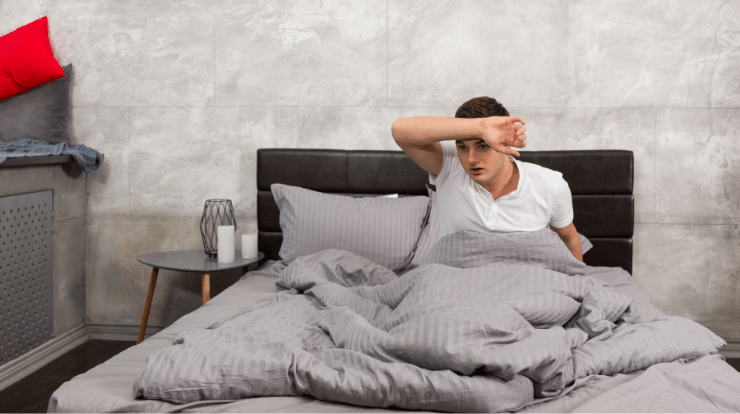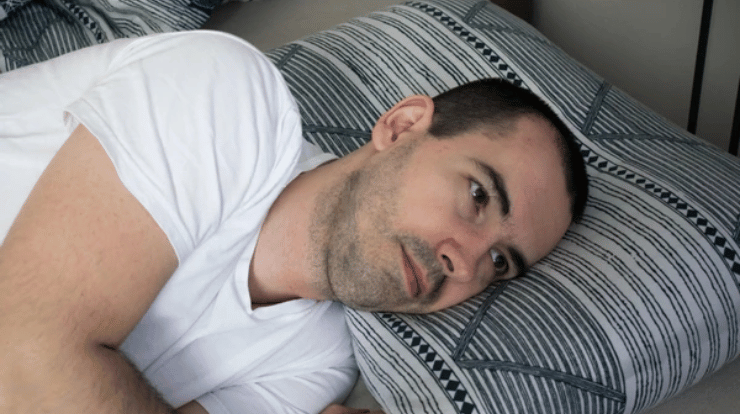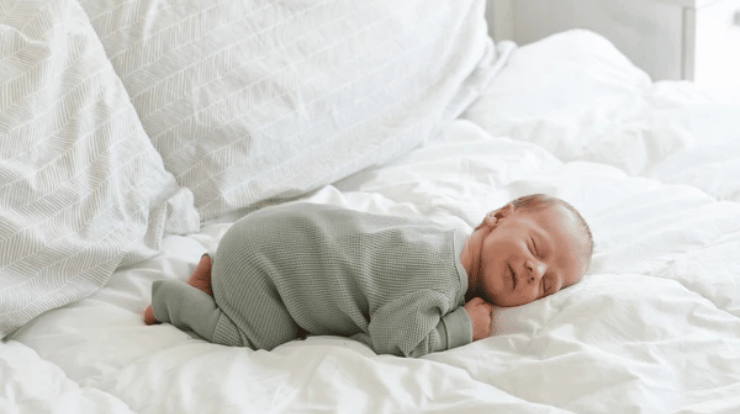
Sweating in sleep is a very normal and common phenomenon. It usually happens when we are in deep sleep or when we are dreaming. sweating in sleep is caused by the autonomic nervous system, which controls the body’s involuntary functions. This system is responsible for sweating, as well as other things like heart rate and blood pressure. sweating in sleep is not considered to be a medical condition, and it is not dangerous. sweating in sleep can be bothersome, but it is usually not harmful.
Why do I sweat in my sleep?
Following are the 10 most common causes of sweating in sleep:
1. Menopause
Hot flashes and night sweats are common symptoms of menopause. About 75% of women experience hot flashes during menopause. Hot flashes are sudden feelings of warmth, which are usually most intense over the head, neck, and chest. A hot flash may last from a few seconds to several minutes. They can occur several times a day or just a few times a week. Night sweats (also called nocturnal hyperhidrosis) refer to excess sweating during sleep.
2. Infections
There are many types of infections that can cause night sweats as a symptom, including tuberculosis, endocarditis, osteomyelitis, and abscesses. Infections are more likely to cause night sweats in children than adults.
3. Certain medications
Medications that can cause night sweats as a side effect include antidepressants, hormonal therapies, antipsychotics, and illegal drugs such as methamphetamine.
4. Malaria
This mosquito-borne disease can cause fever, chills, and night sweats.
5. Some types of Cancer
Night sweats can be a symptom of some types of cancer, such as leukemia and lymphoma. They may also be a symptom of other cancers that have spread (metastasized) to the bone marrow or nervous system.
6. Idiopathic hyperhidrosis
This condition is characterized by excessive sweating that has no underlying medical cause. It often begins during adolescence and tends to run in families.
7. Obesity
Being overweight or obese can lead to excessive sweating, especially at night.

8. hormonal imbalances
Hormonal imbalances can cause night sweats. Conditions that may cause hormonal imbalances include pregnancy, menopause, hypothyroidism, and hyperthyroidism.
9. Anxiety and stress
Stress and anxiety can trigger the fight-or-flight response, which causes an increase in heart rate and sweating.
10. Sleep apnea
This sleep disorder is characterized by periods of stopped breathing during sleep. It can cause night sweats as a result of the body’s efforts to compensate for the lack of oxygen.
Sweating around the neck and chest at night
If you’re sweating around your neck and chest at night, it could be a sign that your body is overheating. This could be caused by a number of things, including:
- Wearing clothing that’s too tight or doesn’t allow your skin to breathe
- Sleeping in a room that’s too warm
- Having a fever or infection
- Going through menopause
- Taking certain medications
If you’re concerned about your sweating, talk to your doctor. They can help you figure out what’s causing it and how to treat it.
How to stop sweating in sleep?
Following are the 11 ways to stop sweating in sleep:
1. Drink cool or iced water before sleeping
There are few things worse than waking up in the middle of the night drenched in sweat. Not only is it uncomfortable, but it can also disrupt your sleep and leave you feeling groggy in the morning. If you’re looking for a way to stop sweating in sleep, one simple solution is to drink cool or iced water before bed. The water will help to lower your body temperature, making it less likely that you’ll sweat during the night.
2. Place a fan near your bed
To stop sweating in sleep, place a fan near your bed. The circulating air will evaporate the sweat on your skin and reduce your body temperature. You may also want to position the fan so that it blows directly on you while you sleep. This will help to keep you cool and dry throughout the night. Just be sure to stay hydrated by drinking plenty of water during the day. With a little bit of planning, you can say goodbye to sweaty sleepless nights.
3. Sleep on your back
To stop sweating in sleep, one method is to sleep on your back. Research indicates that this helps because it decreases the amount of heat that your body produces. Additionally, it allows any sweat that is produced to evaporate more quickly. To ensure that you stay on your back, you can try sleeping with a pillow behind your back or investing in a specialized mattress. While it may take some time to get used to sleeping in this position, it can be an effective way to stop sweating in sleep.
4. Wear light, loose-fitting clothing to bed
To stop sweating in sleep, wear light, loose-fitting clothing to bed. This will help to regulate your body temperature and prevent you from overheating during the night. Sweating is a natural process that helps to cool the body, but it can be disruptive to sleep. If you often find yourself waking up sweaty, try wearing lighter clothing to bed and see if that makes a difference.
5. Keep your bedroom cool and comfortable
The ideal temperature for sleeping is between 60 and 67 degrees Fahrenheit. If your bedroom is too hot or too cold, it can disrupt your sleep and lead to night sweats. To help ensure a restful night’s sleep, make sure to keep your bedroom at a comfortable temperature.

6. Use absorbent sheets and pillowcases
To stop sweating in sleep, many people use absorbent sheets and pillowcases. These sheets and pillowcases are designed to absorb sweat and keep you dry during the night. They are usually made of cotton or other absorbent materials, and they can be washed in the washing machine. Some people find that these sheets and pillowcases help to reduce their sweating, while others find that they do not work as well. If you are interested in trying absorbent sheets and pillowcases, you can purchase them at most stores that sell bedding. You may also want to ask your doctor for a recommendation.
7. Take a cool shower or bath before bedtime
To stop sweating in sleep, take a cool shower or bath before bedtime. This will help to cool your body temperature and prevent you from sweating during the night.
8. Try antiperspirant before bedtime
Antiperspirants work by blocking the pores and preventing sweat from getting to the surface of the skin. This can help to keep you dry and comfortable during the night. When applied before bedtime, antiperspirants can also help to reduce morning sweat.
To get the most out of your antiperspirant, be sure to apply it to clean, dry skin. You may also want to consider applying it to your underarms, chest, and back. When used as directed, antiperspirants are safe and effective for most people. However, if you have sensitive skin, you may want to talk to your doctor before using an antiperspirant.
9. Avoid spicy foods, caffeine, and alcohol before bedtime
Consuming these substances can trigger your body’s natural cooling mechanism, causing you to sweat more during the night. In addition, spicy and caffeinated foods can also disrupt your sleep cycle, making it more difficult to get a good night’s rest. If you find that you are sweating excessively during the night, try eliminating these foods from your diet and see if it makes a difference. You may also want to consult with a doctor to rule out any underlying medical conditions.
10. Practice stress-relieving techniques
While night sweats can be caused by a variety of factors, including medications and menopause, they can also be the result of stress. If you find yourself waking up drenched in sweat, it may be worth trying some stress-relieving techniques before bedtime. Yoga and meditation are both excellent ways to promote relaxation, and there are many apps and videos available that can guide you through a session. You may also want to try journaling or reading before bed to clear your mind and help you drift off to sleep. By reducing your stress levels, you may find that your night sweats become less frequent.
11. See your doctor if your sweating is excessive or disrupting your sleep
To stop sweating in sleep, see your doctor if your sweating is excessive or disrupting your sleep. Many people sweat excessively due to underlying medical conditions, such as hyperhidrosis. If you think you may have this condition, see your doctor for an evaluation.






